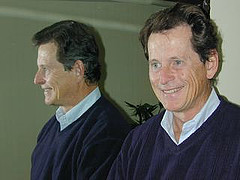We’ve all experienced the wisdom that comes with hindsight. It’s easy to have 20-20 vision after the fact, to achieve clarity and perspective on our lives and choices in retrospect. What is sometimes less obvious to us is how much of our day-to-day actions, behavior, moods and feelings are a function of the past.
As I grow older, I find myself appreciating how much of the way I see the world is shaped by my past. When you think about it, this implies that the older I get, the more past I have to draw on to shape my worldview and the easier it becomes to just do whatever it is I automatically do based on the way I see things. I begin to lose touch with the fact that my point-of-view is not the truth—it’s just a composite of my individual and cultural history.
I see this in organizations all the time. After all, what is budgeting if not projecting the past into the future, calling it a ‘forecast’ and then organizing plans and allocating resources based on the forecast? Most of the time, the results are pretty close to the forecast or we have a big excuse or explanation of why it doesn’t happen. We rarely say that the forecast was wrong, and we never question the value and relevance of forecasting itself. The reason for this is that we believe we need to “know” what will happen in order to control what happens. I wrote an article called Managers Anonymous that suggested the whole culture of management is addicted to control and prediction, which, in effect, turns planning into a practice of self-fulfilling prophecy.
I am suggesting here that most of us live our lives in the same way. We make commitments and take actions based on the past. We are driving our lives by looking in the rearview mirror! Now this would not be a problem if nothing changed or if things changed very slowly, because what we’ve learned from past experience would apply in the present and theoretically lead to better decisions and outcomes. The problem occurs when the world is changing faster and faster, making the past a less reliable basis for making decisions. We are more and more likely to have collisions and unpredictable surprises that, at best, are sources of tremendous stress and anxiety and, at worst, are disasters.
I think older people have always had some difficulty understanding and relating to the young, but I think the differences have been more along the lines of attitudes and behaviors rather than the kinds of profound differences we observe today. One of my friends mentioned the other day that, in her experience, what the Boomers want is to be cool, to be on top of what is happening in all sorts of areas. I think what she was saying is that we all want to feel like we are current, relevant and engaged in the world.
When we become disconnected (for whatever reasons) or can’t relate to or understand contemporary culture, we begin to withdraw into what we do understand and what we can and do relate to—the past. We become increasingly fixated on the rearview mirror, increasingly blind to the world around us and all the possibilities that are available if we can observe and create them for ourselves.
The answer isn’t to ignore or try to forget the past. That would be nonsense and we can’t really do it anyway.
We need to distinguish between our commitments to creating the future and the past. We need to ask the question, “Do our commitments create the future or does our past-based view (rearview mirror) of the future determine or limit what we commit to?” George Bernard Shaw summed up this idea when he said:
If we only commit to what is reasonable, then by definition we will get more of the same.
So are we going to live reasonably for the next 20 to 30 years of our lives—driving by our rearview mirrors? If so, then we will predictably inherit the culture of aging and the realities that go with it.
If not, then we have a possibility of inventing a new reality, giving new meaning and purpose to what growing older can be. We could drive our lives using the steering wheel and truly be able to explore different possibilities.
The choice is ours.

